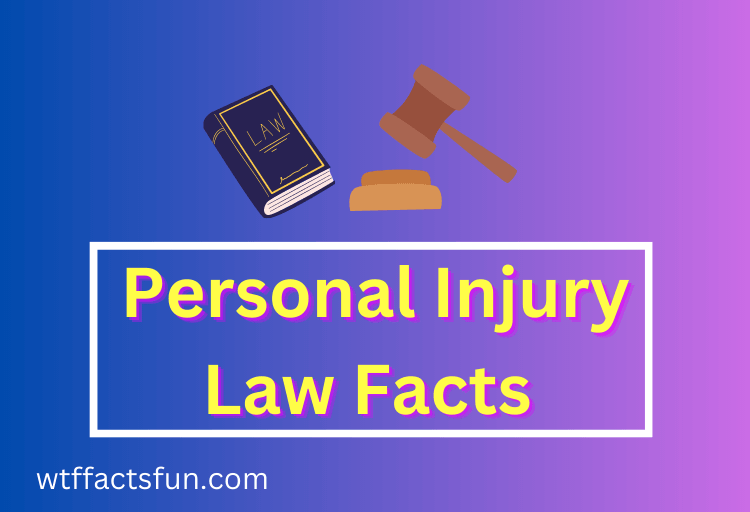
Table of Contents
Personal Injury Law Facts
Personal Injury Law Facts: Personal injury law involves legal disputes that arise when one person suffers harm from an accident or injury, and someone else might be legally responsible for that harm. This area of law is also referred to as tort law. Personal injury cases can involve a wide range of accidents, including car accidents, slip and fall accidents, medical malpractice, and product liability.
If you have been injured in an accident that was caused by someone else’s negligence, you may be entitled to compensation for your injuries, including medical expenses, lost wages, and pain and suffering. To help you understand personal injury law, we have put together this detailed article that covers the key facts you need to know.
- The legal process for personal injury cases includes filing a complaint, engaging in the discovery process, negotiating a settlement, and going to trial if a settlement cannot be reached.
- The types of compensation you may be eligible for in a personal injury case include medical expenses, lost wages, pain and suffering, property damage, and punitive damages.
- It is important to note that there is a statute of limitations for personal injury cases, meaning there is a time limit for filing a lawsuit.
- Hiring an experienced personal injury attorney can help you navigate the legal process and increase your chances of receiving fair compensation for your injuries.
- Personal injury cases are often based on the legal concept of negligence, which means that a person failed to take reasonable care and caused injury or harm to another person.
- In some cases, personal injury cases may also involve intentional acts, such as assault or battery.
- In a personal injury case, the burden of proof is on the plaintiff to prove that the defendant was responsible for the injury or harm.
- Personal injury cases can be settled out of court through negotiations between the parties, or they can be decided in court by a judge or jury.
- The amount of compensation awarded in a personal injury case depends on the specific circumstances of the case, including the severity of the injuries and the impact they have on the plaintiff’s life.
- Personal injury cases can take months or even years to resolve, depending on the complexity of the case and the court’s schedule.
- Personal injury law varies by state, so it is important to consult with an attorney who is knowledgeable about the laws in your state.
- Personal injury law also includes wrongful death claims, which allow the surviving family members of a person who died as a result of someone else’s negligence to seek compensation for their losses.
- Car Accidents: This is one of the most common types of personal injury cases. If you have been injured in a car accident that was caused by someone else’s negligence, you may be entitled to compensation for your injuries.
- Slip and Fall Accidents: Slip and fall accidents can occur in many different settings, including restaurants, grocery stores, and public spaces. If you have been injured in a slip-and-fall accident that was caused by someone else’s negligence, you may be entitled to compensation.
- Medical Malpractice: Medical malpractice occurs when a healthcare provider fails to provide the proper standard of care, resulting in injury or harm to the patient. If you have been injured due to medical malpractice, you may be entitled to compensation.
- Product Liability: Product liability cases arise when a defective product causes injury or harm to the consumer. If you have been injured due to a defective product, you may be entitled to compensation.
- Dog Bites: If you have been bitten by a dog, you may be entitled to compensation for your injuries. Dog owners are responsible for ensuring that their pets do not cause harm to others.
Final Words:
In conclusion, personal injury law covers a wide range of accidents and injuries, including car accidents, slip and fall accidents, medical malpractice, product liability, and dog bites. If you have been injured due to someone else’s negligence, you may be entitled to compensation for your injuries. The legal process for personal injury cases includes filing a complaint, engaging in the discovery process, negotiating a settlement, and going to trial if a settlement cannot be reached.
The types of compensation you may be eligible for include medical expenses, lost wages, pain and suffering, property damage, and punitive damages. It is important to consult with an attorney to ensure that you file your lawsuit within the appropriate time frame, as there is a statute of limitations for personal injury cases.
FAQs
What Is Considered a Personal Injury?
A personal injury is any physical or psychological harm that is caused by another person’s negligence or intentional actions and can include things like car accidents, slip and falls, medical malpractice, and product liability.
What Happens in a Personal Injury Lawsuit?
In a personal injury lawsuit, the injured party files a complaint against the party they believe is responsible for their injuries, and the case proceeds through the legal process, which may include discovery, negotiation, and possibly a trial.
Read also:
22 Interesting Math Facts For High School